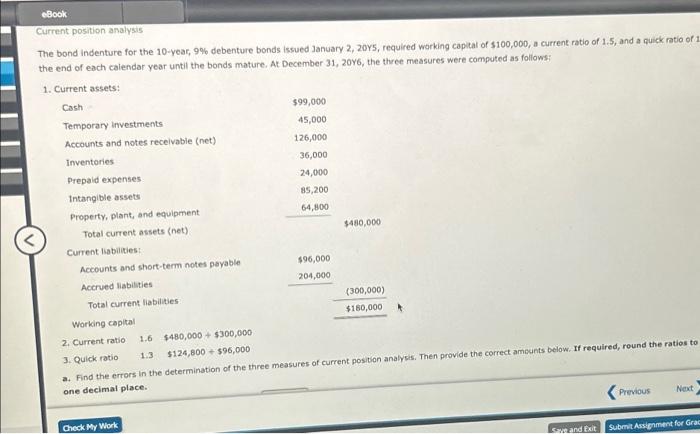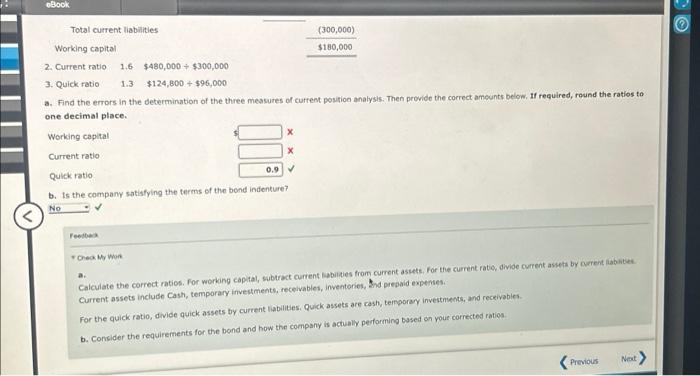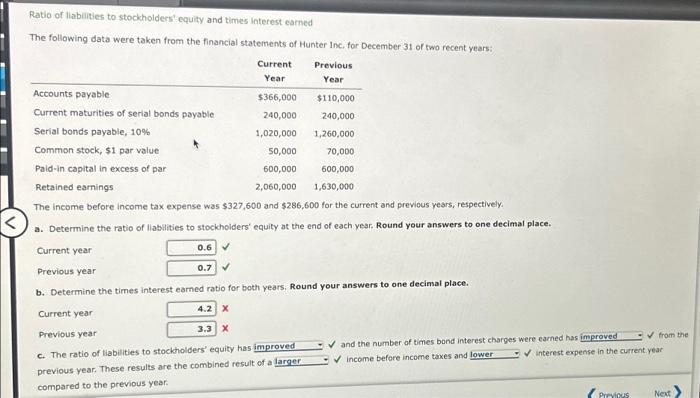eBook Current position analysis The bond indenture for the 10-year, 9% debenture bonds issued January 2, 2015, required working capital of $100,000, a current



eBook Current position analysis The bond indenture for the 10-year, 9% debenture bonds issued January 2, 2015, required working capital of $100,000, a current ratio of 1.5, and a quick ratio of 1 the end of each calendar year until the bonds mature. At December 31, 2016, the three measures were computed as follows: 1. Current assets: Cash $99,000 Temporary investments 45,000 Accounts and notes receivable (net) 126,000 Inventories 36,000 Prepaid expenses 24,000 Intangible assets 85,200 Property, plant, and equipment 64,800 Total current assets (net) $480,000 Current liabilities: Accounts and short-term notes payable $96,000 Accrued liabilities 204,000 Total current liabilities: (300,000) $180,000 Working capital 2. Current ratio 1.6 $480,000+ $300,000 3. Quick ratio 1.3 $124,800 $96,000 a. Find the errors in the determination of the three measures of current position analysis. Then provide the correct amounts below. If required, round the ratios to one decimal place. Check My Work Previous Next Save and Exit Submit Assignment for Grac eBook Total current liabilities Working capital 2. Current ratio 1.6 $480,000+ $300,000 3. Quick ratio 1.3 $124,800+ $96,000 (300,000) $180,000 a. Find the errors in the determination of the three measures of current position analysis. Then provide the correct amounts below. If required, round the ratios to one decimal place. Working capital Current ratio Quick ratio x 0.9 b. Is the company satisfying the terms of the bond indenture? No Feedback Check My Work a. Calculate the correct ratios. For working capital, subtract current liabilities from current assets. For the current ratio, divide current assets by current liabilities Current assets include Cash, temporary investments, receivables, inventories, and prepaid expenses. For the quick ratio, divide quick assets by current liabilities. Quick assets are cash, temporary investments, and receivables. b. Consider the requirements for the bond and how the company is actually performing based on your corrected ratios Ratio of liabilities to stockholders' equity and times interest earned The following data were taken from the financial statements of Hunter Inc. for December 31 of two recent years: Current Previous Year Year Accounts payable $366,000 $110,000 Current maturities of serial bonds payable 240,000 240,000 Serial bonds payable, 10% 1,020,000 1,260,000 Common stock, $1 par value 50,000 70,000 Paid-in capital in excess of par Retained earnings 600,000 2,060,000 600,000 1,630,000 The income before income tax expense was $327,600 and $286,600 for the current and previous years, respectively. a. Determine the ratio of liabilities to stockholders' equity at the end of each year. Round your answers to one decimal place. Current year 0.6 Previous year 0.7 b. Determine the times interest earned ratio for both years. Round your answers to one decimal place. Current year Previous year 4.2 X 3.3 X c. The ratio of liabilities to stockholders' equity has improved. previous year. These results are the combined result of a larger compared to the previous year. and the number of times bond interest charges were earned has improved income before income taxes and lower from the Vinterest expense in the current year Previous Next
Step by Step Solution
There are 3 Steps involved in it
Step: 1
a Working capital can be computed as Current Assets Current Liabilities Current assets is Cash Tempo...
See step-by-step solutions with expert insights and AI powered tools for academic success
Step: 2

Step: 3

Ace Your Homework with AI
Get the answers you need in no time with our AI-driven, step-by-step assistance
Get Started


